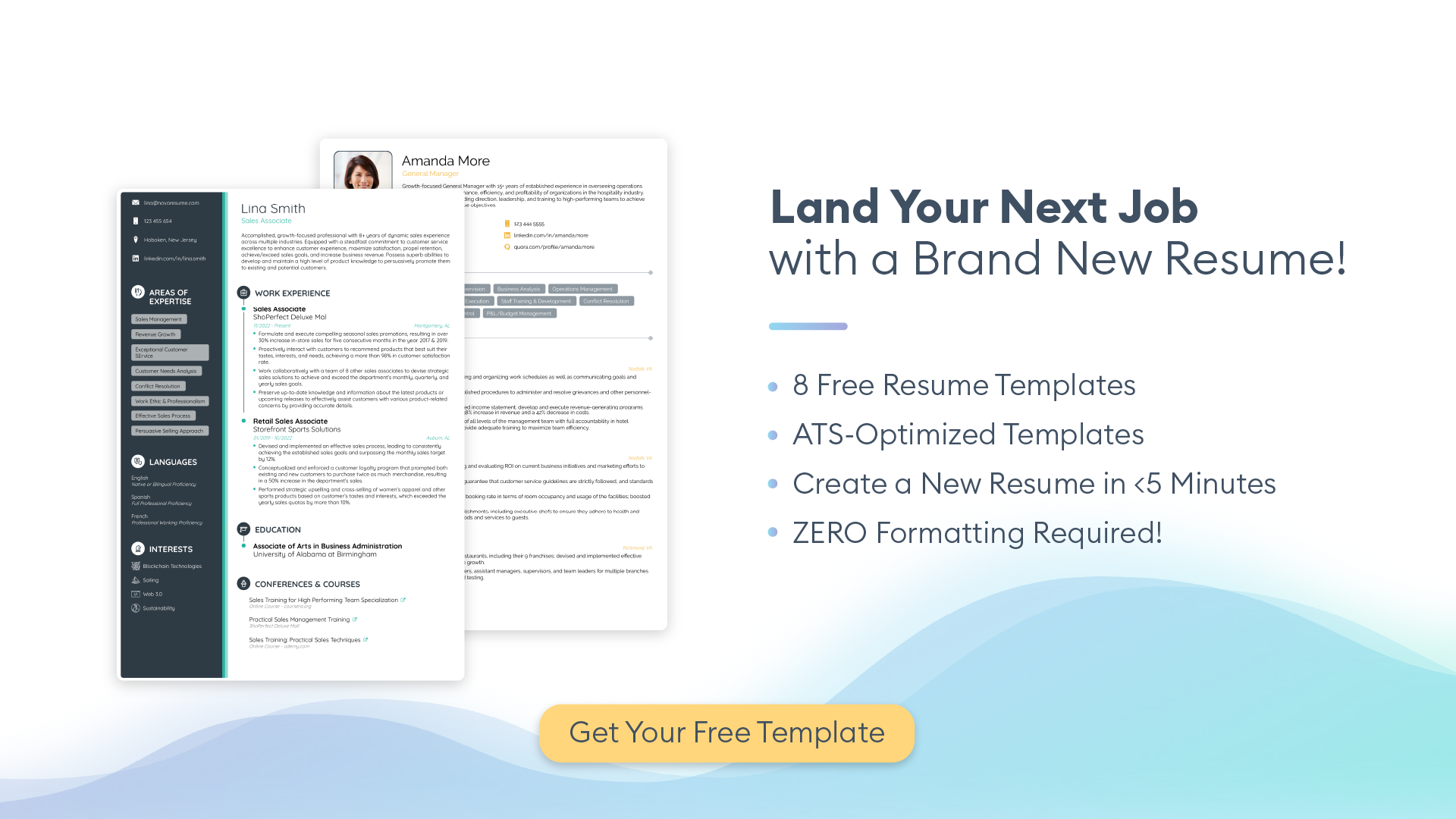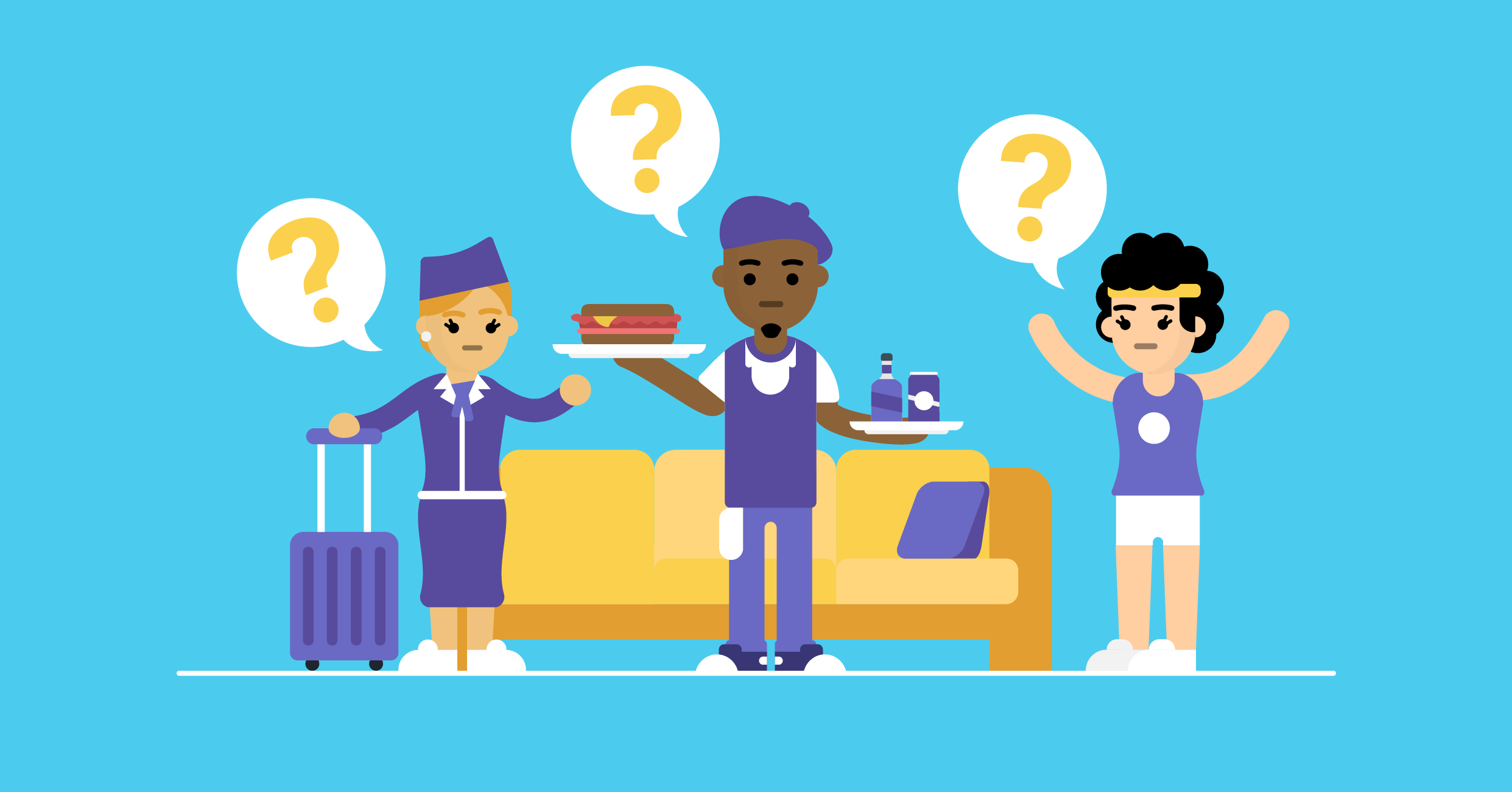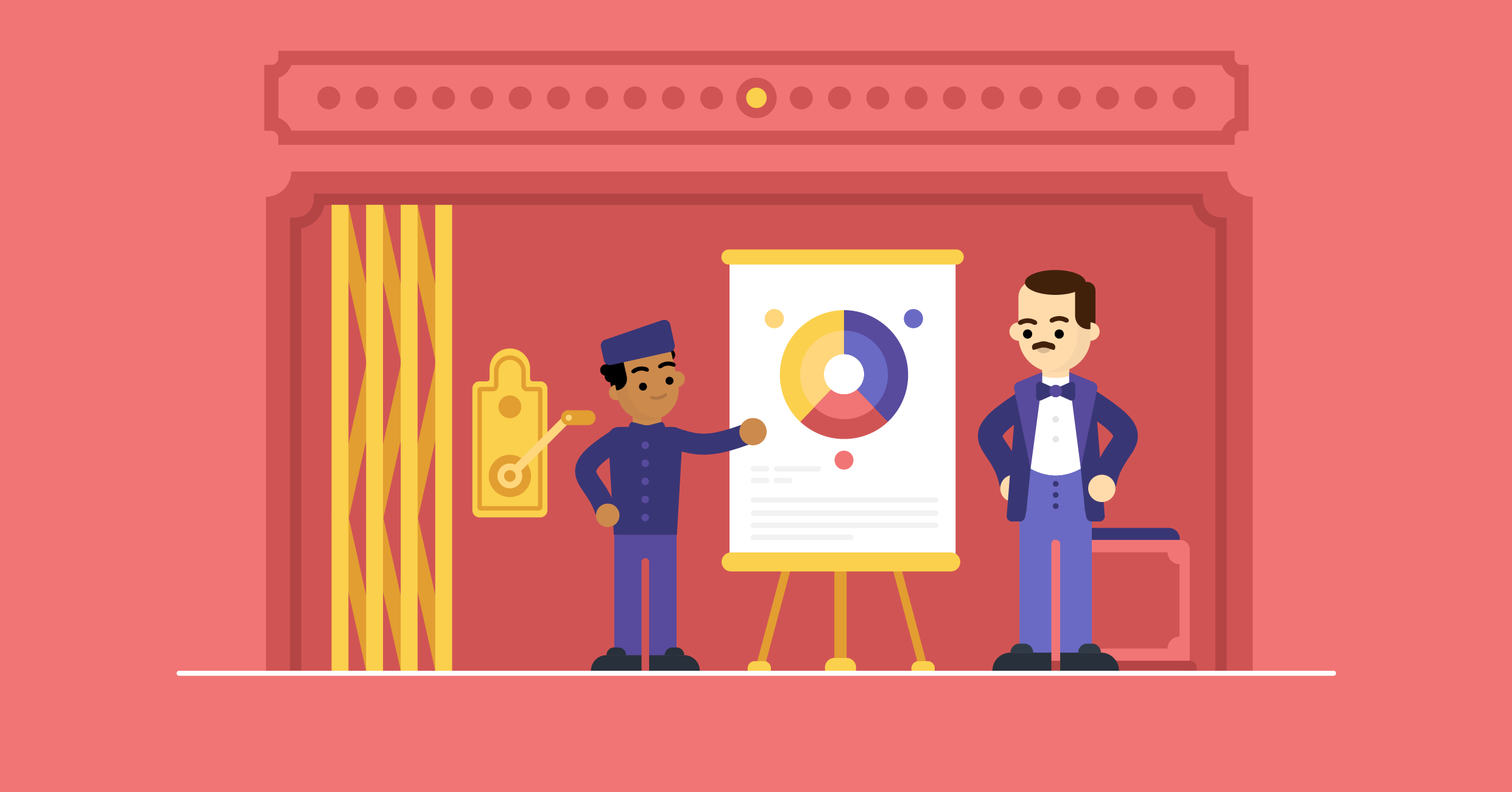16 Tips to Prepare for Your Job Interview and Get Hired
Updated on 02/24/2026

Landing a job isn’t just about having the right skills or submitting a great resume. It comes down to proving you’re the best choice in a short, high-pressure conversation.
Too many candidates walk into job interviews unprepared, stumble on predictable questions, and leave wishing they’d done more.
But here’s the good news:
With the right interview preparation tips, you can walk in confident, answer with impact, and leave a lasting impression on your future employer. In this article, we cover everything you need to know.

Want to create a resume that grabs a hiring manager’s attention? Try one of Novoresume’s modern templates!
Our resume builder lets you build a powerful job application in no time.
16 Tips to Prepare for Your Job Interview
Preparation is the difference between showing up as a random, nervous applicant and walking in as a well-prepared candidate. These tips will help build your confidence far before the interview begins.
#1. Re-read the Job Description
You’ve probably already combed through the job description when you were making your resume or cover letter. But before the interview, it’s worth going back for a second, deeper read. This time, you’re not just confirming you’re qualified – you’re looking for the clues that will help you answer questions more strategically and show you understand the role inside and out.
Start by breaking down the description into two parts:
- Key responsibilities. These will guide the examples you prepare for behavioral questions.
- Required and preferred skills. Match these to your abilities and be prepared to support them with evidence.
For example, if the job description highlights “cross-functional collaboration” and “tight deadlines,” you can focus your answer on a time you worked with multiple teams to deliver a project early. Mirror the language and priorities from the posting so the interviewer sees you as a natural fit.
Re-reading the job description also helps you anticipate role-specific questions. If you notice a recurring emphasis on a specific tool, process, or outcome, you can prepare examples that directly address it. It’s a small step that can make your answers feel targeted, relevant, and memorable.
#2. Research the Company and the Role
A glance at a company’s homepage isn’t enough to stand out in an interview. You need a deeper understanding of what they do, how they work, and exactly where your role fits in. This shows the interviewer you’re not just looking for any job, but this job at their company.
Start with their product or service. Explore their website, read product descriptions, watch demos, or even try the product yourself. Look for:
- The main value proposition (what makes it unique or competitive)
- Key features or services they emphasize
- Recent updates, launches, or news mentions
Next, dig into the company culture. Read the “About” and “Careers” pages, check Glassdoor reviews, and follow their social media accounts. You’ll pick up on the tone, values, and priorities that matter to them – and you can reflect these in your answers.
For instance, if collaboration is a recurring theme, highlight teamwork skills in your examples.
Finally, research the role itself and go beyond the job description. Look for similar positions on LinkedIn, connect with current or former employees, or read industry blogs to understand what success looks like in that role. This helps you answer questions with more depth and ensures you ask smarter, more targeted questions when it’s your turn.
#3. Know Your Resume Inside Out
Your resume got you the interview, but now you have to bring those bullet points to life. The interviewer might ask about anything on it – dates, achievements, or specific responsibilities. So, you need to be ready to expand on every detail without hesitation.
A good way to prepare is to:
- Review each job, project, and skill you’ve listed.
- Note down one to two key achievements for every role.
- Be ready to explain employment gaps, career changes, or anything that may strike the hiring manager as unusual.
- Connect each experience to the requirements of the new role.
For example, if your resume says you “led a cross-departmental initiative,” be ready to walk them through what the project was, your specific role, and the outcome. Avoid vague answers and use numbers, results, and powerful action verbs to make a stronger impression.
Keep in mind that anything on your resume is fair game during the interview. So, if you can confidently talk about every line, you’ll appear well-prepared and more credible as a candidate.
#4. Practice Common Interview Questions
While every interview is different, certain questions come up so often that you’re expected to prepare for them.
All these common interview questions are used to learn more about you, both as a person and as a professional. So, you’ll likely need to answer them whether you’re a recent graduate or a seasoned professional with decades of experience.
Some of them include:
- “Tell me about yourself.”
- “Why do you want to work here?”
- “What are your strengths and weaknesses?”
- “Tell me about a challenge you’ve faced at work.”
- “Where do you see yourself in five years?”
The trick is to avoid generic, rehearsed answers. Instead, tie your responses to the job description, the company’s values, and your measurable achievements.
For example, if the company emphasizes innovation, highlight moments where you introduced new processes or creative ideas. Practicing out loud can help you refine your delivery so it sounds confident and natural. Try doing this alone, with a friend, or in a mock interview – whatever works for you.
Now, here are three examples of strong, tailored answers:
#1. Tell me about yourself
Sample Answer 1
"I’m a marketing coordinator with four years of experience managing social media campaigns and content strategy. In my last role at XYZ Agency, I grew our clients’ engagement rates by an average of 35% through targeted campaigns. I’m now looking to bring my skills in analytics-driven marketing to a company like yours that values creative, data-backed strategies."
And if you don’t have a lot of work experience, you can still nail this common interview question:
Sample Answer 2
"I recently graduated with a degree in Business Administration, where I focused on project management and marketing strategy. During my final year, I led a student consulting project for a local nonprofit, helping them improve their online presence and increase donations. I’m excited to bring the same dedication and fresh perspective to a full-time role where I can keep learning and contributing."
Learn about more words to describe yourself during a job interview with this article.
#2. Why do you want to work here?
Sample Answer 1
"Your company’s focus on sustainable packaging resonates with me. In my current role, I led a project that reduced our production waste by 18%, and I’d love the opportunity to contribute to a team that’s pushing industry standards in sustainability."
Here’s an answer tailored for less experienced candidates:
Sample Answer 2
"I’m drawn to your commitment to sustainability and innovation. While I’m at the start of my career, my volunteer work with a campus environmental group taught me how small, thoughtful changes can make a big impact. I’m eager to join a team where I can apply that mindset and grow my skills."
Learn more about how to answer “Why do you want to work here?” with our dedicated article.
#3. What are your strengths and weaknesses?
Sample Answer 1
"One of my strengths is adaptability: when our main supplier fell through last year, I coordinated with three backup vendors to ensure we met our deadline without increasing costs. As for a weakness, I used to take on too many tasks myself. I’ve been working on this by delegating more effectively and trusting my team’s expertise."
And this is how you could frame your answer as a candidate with fewer qualifications:
Sample Answer 2
"A key strength is my willingness to learn quickly: during my internship at a local startup, I taught myself a new project management tool in under a week, which helped the team meet a tight deadline. A weakness I’m working on is speaking up more in group settings, and I’ve been actively seeking opportunities in class projects and volunteer work to build that confidence."
Learn more about how to talk about your greatest strengths and weaknesses with our dedicated articles.
#5. Prepare Your STAR Answers
A lot of interview questions are designed to see how you’ve handled real situations in the past. Your best bet here is the STAR method, a simple framework that keeps your answers clear, focused, and compelling.
STAR stands for:
- Situation. Set the scene and give context.
- Task. Explain your responsibility or goal in that situation.
- Action. Describe the steps you took to address the challenge or achieve the goal.
- Result. Share the outcome, ideally with measurable impact.
The STAR method keeps you from rambling, as well as lets you include important details and highlight your results. It works particularly well for questions like “Tell me about a time you overcame a challenge” or “Give an example of a project you’re proud of.”
Let’s take one of the most common STAR interview questions as an example:
Sample STAR Question and Answer
“Can you tell me of a time you accomplished something noteworthy? How did you manage it?”Situation: “In my previous role as a sales associate, our team was struggling to hit monthly targets during the slow season.”
Task: “My manager asked me to find ways to boost sales without increasing the marketing budget.”
Action: “I analyzed our past customer data to identify top repeat buyers and personally reached out to them with a loyalty discount. I also suggested bundling our most popular products to increase average order value.”
Result: “Within three weeks, our sales were up by 22%, and the bundling strategy became a permanent part of our sales approach.”
The STAR method works because it tells a complete story. It gives the interviewer context, shows how you think and act in a professional setting, and proves you can deliver results, which is exactly what they want to know
#6. Think of Questions for the Interviewer
When the interviewer asks, “Do you have any questions for me?” it’s part of the evaluation, not just a polite closing line.
Not having any questions can come across as disengaged or unprepared, while asking thoughtful ones shows genuine interest, curiosity, and even strategic thinking. This is your chance to demonstrate that you’re evaluating them just as much as they’re evaluating you.
Good questions signal that you’ve researched the company and the role, give you valuable insight into whether the job is right for you, and create a two-way conversation instead of a one-sided interrogation.
Here are some examples of smart questions to ask the interviewer:
- What does success look like in this role over the first 6–12 months?
- Can you describe the team I’ll be working with?
- What are the biggest challenges the team or company is currently facing?
- How would you describe the company culture here?
- What opportunities for professional growth and development are available?
- How do you measure performance for this role?
- What are the next steps in the hiring process?
#7. Review Industry Trends
Walking into an interview with up-to-date knowledge of your industry can set you apart from other candidates.
It shows you’re more than qualified – you’re an engaged and forward-thinking candidate who understands where the field is headed and how that might impact the company.
Start by researching:
- Recent news or developments. New technologies, market shifts, regulations, or consumer trends.
- Key competitors. Who they are, what they’re doing differently, and how your prospective employer compares.
- Emerging challenges and opportunities. For example, sustainability efforts, digital transformation, or global market changes.
Let’s say you’re interviewing for a role in retail operations, and you’ve read about the industry’s shift toward AI-powered inventory management. You might ask how the company is integrating AI into its processes or suggest ways you’ve seen it improve efficiency elsewhere.
This signals to the employer that you’re thinking beyond day-to-day tasks and you’re considering how your work fits into the bigger picture.
#8. Do Mock Interviews
Practice makes perfect, as long as your practice is realistic. Mock interviews help you get comfortable answering questions on the spot, managing nerves, and fine-tuning your delivery.
You can practice with:
- A friend or mentor who can give honest feedback.
- Career services at your school or a local job center.
- Online platforms or AI tools that simulate interviews.
To make mock interviews more effective:
- Dress as you would for the real thing to get into the right mindset.
- Time your answers to keep them focused (Two to three minutes for most questions).
- Record the session so you can review your tone, body language, and pacing.
Even one or two solid mock interviews before the big day can help you walk into the real thing feeling more relaxed, confident, and ready to make a great impression.
#9. Plan Your Outfit
What you wear to an interview is part of your first impression, and first impressions set the tone for the rest of your interview. The right outfit shows professionalism, respect, and an understanding of the company’s culture. But the wrong one can distract from your qualifications.
Here’s how to adjust your outfit to the company’s standards:
- Research the dress code. Check the company’s social media or website for photos of employees. Some companies are more casual, while others lean towards the formal side of dress codes.
- Err on the side of formal. It’s better to be overdressed than underdressed.
- Keep it clean and simple. Avoid loud patterns, overly flashy accessories, or anything that could be distracting.
If you’re unsure, a safe bet is business casual: a button-down shirt or blouse, tailored pants or a skirt, and closed-toe shoes. For creative industries, smart-casual with a personal touch can work. Whatever you choose, just make sure it’s clean, well-fitted, and something you feel confident in.
#10. Check Your Tech
For virtual interviews, technical issues can derail even the best-prepared candidate. Testing your setup in advance shows you value the interviewer’s time and that you’re taking the opportunity seriously.
Here’s our checklist for smooth Zoom or phone interviews:
- Test your camera and microphone at least a day before.
- Check your internet connection and have a backup plan (e.g., hotspot).
- Choose a quiet, well-lit space with minimal background distractions.
- Familiarize yourself with the platform (Zoom, Microsoft Teams, Google Meet) so you know where to find mute, share screen, and chat functions.
A quick five to ten-minute test run with a friend can help you spot potential issues before the interview, such as poor lighting or an echo. It’s a small precaution that can save you a lot of unnecessary stress on the day of the actual interview.
#11. Plan Your Route or Login
Being late to an interview – whether in person or virtual – immediately works against you. Planning your route or logging in ahead of time helps you start on the right foot and prevents this costly interview mistake.
If it’s in person:
- Check travel time using Google Maps or a similar app.
- Plan for delays by aiming to arrive 10–15 minutes early.
- Know where to park or which entrance to use, if applicable.
If it’s virtual:
- Bookmark or otherwise save the meeting link for quick and easy access.
- Log in five to ten minutes early to handle any last-minute issues.
That little buffer of extra time will help you avoid stress and allow you to walk (or log) in calm and collected.
#12. Bring Necessary Materials
Showing up empty-handed makes you look unprepared, but having the right materials on hand helps you stay organized and shows professionalism.
Here’s a list of everything you need to bring for an in-person interview:
- Multiple printed copies of your resume.
- A list of references, if requested.
- A notebook and pen for jotting down important details.
- A portfolio or work samples.
- Any required ID or application documents.
For a virtual interview, keep these items in a digital format and open on your computer for quick access. Being ready for anything helps you adapt smoothly if the interviewer asks for something on the spot.
#13. Get a Good Night’s Sleep
No matter how much prep you’ve done, showing up tired will affect your focus, mood, and overall performance. Rest is an important part of preparing for an interview.
Here are some tips for better sleep the day before:
- Avoid caffeine and heavy meals in the evening.
- Wind down with a relaxing routine like reading or light stretching.
- Set your clothes and materials out beforehand to prevent last-minute stress.
A well-rested mind keeps you sharper, calmer, and better at thinking on your feet. So, it’s exactly what you need to make a great impression.
#14. Arrive Early
Arriving a few minutes early sets a professional tone and shows respect for the interviewer’s time. It also gives you a moment to compose yourself before the conversation begins.
For in-person interviews:
- Try to arrive 10–15 minutes early to leave room for check-ins or unexpected delays.
- Use the extra time to review your notes or take a few deep breaths.
If you’re interviewing for a job through a virtual interview, log in ten minutes ahead to make sure your tech is ready and that you’re settled before the call starts.
Being early instead of rushing also helps you start the interview calm, collected, and in control.
#15. Pay Attention to Your Body Language
Your body language speaks just as loudly as your answers. Even if your words are confident, slouching or avoiding eye contact can undermine your message.
Some key points to remember here:
- Sit up straight with shoulders relaxed but open.
- Maintain natural eye contact, even virtually. Look at the interviewer or the camera lens if it’s a virtual interview.
- Use hand gestures sparingly to emphasize points without being too distracting.
- Smile naturally to appear warm and approachable.
Maintaining good body language projects confidence, professionalism, and engagement, all of which interviewers want in a candidate.
#16. Have a Follow-Up Prepared
Following up after an interview is an important step to reinforce your interest and professionalism. A thoughtful follow-up can help keep you top of mind when they’re making the final call.
A well-written follow-up email has to be timely, personal, professional, and value-driven.
Be sure to:
- Send a thank-you email within 24 hours of your interview.
- Mention something specific from your conversation to make it personal.
- Reiterate your enthusiasm for the role and the value you bring.
Here’s a practical example:
Follow-Up After Job Interview
"Thank you for taking the time to meet with me today. I enjoyed learning more about your upcoming product launch and the role it will play in the company’s growth. I’m excited about the possibility of contributing my experience in product marketing to your team."
A short, well-crafted follow-up can leave a lasting positive impression and sometimes even tip the scales in your favor.
Bonus Tip: Utilize AI
AI tools can be a game-changer when preparing for your job interview, as long as you use them strategically.
Instead of replacing your research or practice, think of AI as your coach, helping you refine answers, brainstorm examples, and even simulate interview scenarios.
These are just a few of the ways AI can help you prep for the upcoming job interview:
- Generate practice questions based on the job description.
- Refine your answers by pasting them into an AI tool and asking for feedback on clarity and conciseness.
- Role-play mock interviews where the AI acts as the interviewer.
- Research the company and industry faster by summarizing recent news or trends.
For example, you could paste the job description into an AI tool and ask it to create 15 possible interview questions. Then, use STAR-formatted answers to practice responding.
This way, you won’t be caught off guard by predictable questions and can deliver your answers confidently.
FAQs About Job Interview Tips
Do you still have some questions related to the best job interview tips? Check out these answers to the most frequently asked questions below:
Key Takeaways
We’ve reached the end of our article! By now, you should be well-prepared to nail the job interview and get the role.
Before you go, here are the main points we covered in our article:
- Preparation is the best way to replace nerves with confidence. Research, practice, and planning give you the edge.
- Re-read the job description and research the company, role, and industry so your answers feel targeted and relevant.
- Practice common interview questions (like “Tell me about yourself”) and use the STAR method to structure clear, impactful answers.
- Ask the interviewer a couple of meaningful questions back, instead of just answering. It shows engagement and helps you assess if the role is right for you.
- Plan the practical details – your outfit, route, or login, materials you’ll need, and your tech setup – in advance.
- Pay attention to your body language, punctuality, and rest. These small details shape the first impression you give the interviewer.
- Always follow up with a thoughtful thank-you email after the interview to reinforce your interest and professionalism.



